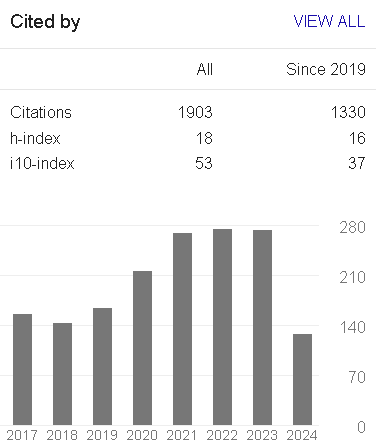Reasoning about inexact dates using dense vector representation
Keywords:
Temporal logical reasoning, Temporal data representation, Inexact data, Word embedding, Information retrievalAbstract
Representation and reasoning with temporal data is a well-researched problem in logic and computer science. Although many practical applications need the representation of inexact dates and reasoning with such representations, there is no standard developed methodology for it. In this paper, we propose a standard representation of inexact dates based on discrete probability distributions. Inspired by recent breakthroughs in natural language processing and information retrieval in embedding words as dense vectors we have developed a similar approach for representation and comparison of inexact dates.
References
Aristotle, Aristotle's Physics, U of Nebraska Press, 1961.
R. L. Poidevin, The Images of Time: An Essay on Temporal Representation, Oxford: Oxford University Press, 2007.
O. &. M. M. F. Kolomiyets, “KUL: Recognition and Normalization of Temporal Expressions,” in Proceedings of the 5th International Workshop on Semantic Evaluation, 2010.
A. Rabinowitz, “It’s about time: historical periodization and Linked Ancient World Data,” ISAW Papers 7.22, 2014.
Y. &. G. N. Shoham, “Temporal reasoning in artificial intelligence,” in Exploring artificial intelligence, 1988, pp. 419-438.
B. M. &. S. R. S. Berry, “Age at baptism in preindustrial England,” A Journal of Demography ,pp. Volume 25, 1971 - Issue 3, 1971.
J. &. D. R. Boulton, “Few deaths before baptism: clerical policy, private baptism and the registration of births in Georgian Westminster: a paradox resolved,”Local population studies 94.1 ,pp. 28-47., 2015.
S. e. Greenhalgh, Situating fertility: Anthropology and demographic inquiry., Cambridge University Press, 1995..
A. N. Prior, Time and Modality, Oxford: Clarendon Press, 1957.
D. Davidson, “The Logical Form of Action Sentences,” in The Logic of Decision and Action, Pittsburgh, University of Pittsburgh Press, 1967, p. 81–95.
J. F. Allen, “Maintaining knowledge about temporal intervals,” Communications of the ACM. ACM Press, p. 832–84, 1983.
N. T. B. K. I. &. T. Y. Pelekis, “Literature review of spatio-temporal database models.,” The Knowledge Engineering Review, 19(3), pp. 235-274, 2004.
G. a. S. M. a. M. I. a. S. N. Correndo, “Linked timelines: temporal representation and management in linked data,” in Proceedings of the First International Conference on Consuming Linked Data - Volume 665, Aachen, Germany, 2010.
C. a. a. Brenton, “Answer Set Programming for Qualitative Spatio-Temporal Reasoning: Methods and Experiments.,” OASIcs-OpenAccess Series in Informatics. Vol. 52. Schloss Dagstuhl-LeibnizZentrum fuer Informatik, 2016.
A. O'Hagan and M. West, The Oxford Handbook of Applied Bayesian Analysis, Oxford: OUP, 2010.
M. G. D. &. L. V. Fisher, Handbook of Temporal Reasoning in Artificial Intelligence, Elsevier B.V, 2005.
O. (. Stock, Spatial and Temporal Reasoning, KLUWER ACADEMIC PUBLISHERS, 1997.
S.-H. Cha, “"Comprehensive survey on distance/similarity measures between probability density functions,” City 1.2, p. 1, 2007.
T. e. a. Mikolov, “Distributed representations of words and phrases and their compositionality,” in Advances in neural information processing systems. , 2013..
B. a. N. C. Mitra, “Neural Text Embeddings for Information Retrieval.,” in Proceedings of the Tenth ACM International Conference on Web Search and Data Mining. , 2017.
S. H. R. &. L. Y. Chopra, “Learning a similarity metric discriminatively, with application to face verification.,” Computer Vision and Pattern Recognition 1, p. 539–546., 2005.
Downloads
Published
How to Cite
Issue
Section
License
Copyright (c) 2019 COMPUSOFT: An International Journal of Advanced Computer Technology

This work is licensed under a Creative Commons Attribution 4.0 International License.
©2023. COMPUSOFT: AN INTERNATIONAL OF ADVANCED COMPUTER TECHNOLOGY by COMPUSOFT PUBLICATION is licensed under a Creative Commons Attribution 4.0 International License. Based on a work at COMPUSOFT: AN INTERNATIONAL OF ADVANCED COMPUTER TECHNOLOGY. Permissions beyond the scope of this license may be available at Creative Commons Attribution 4.0 International Public License.


